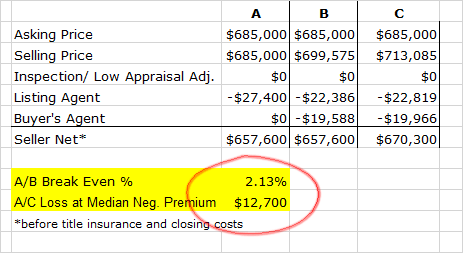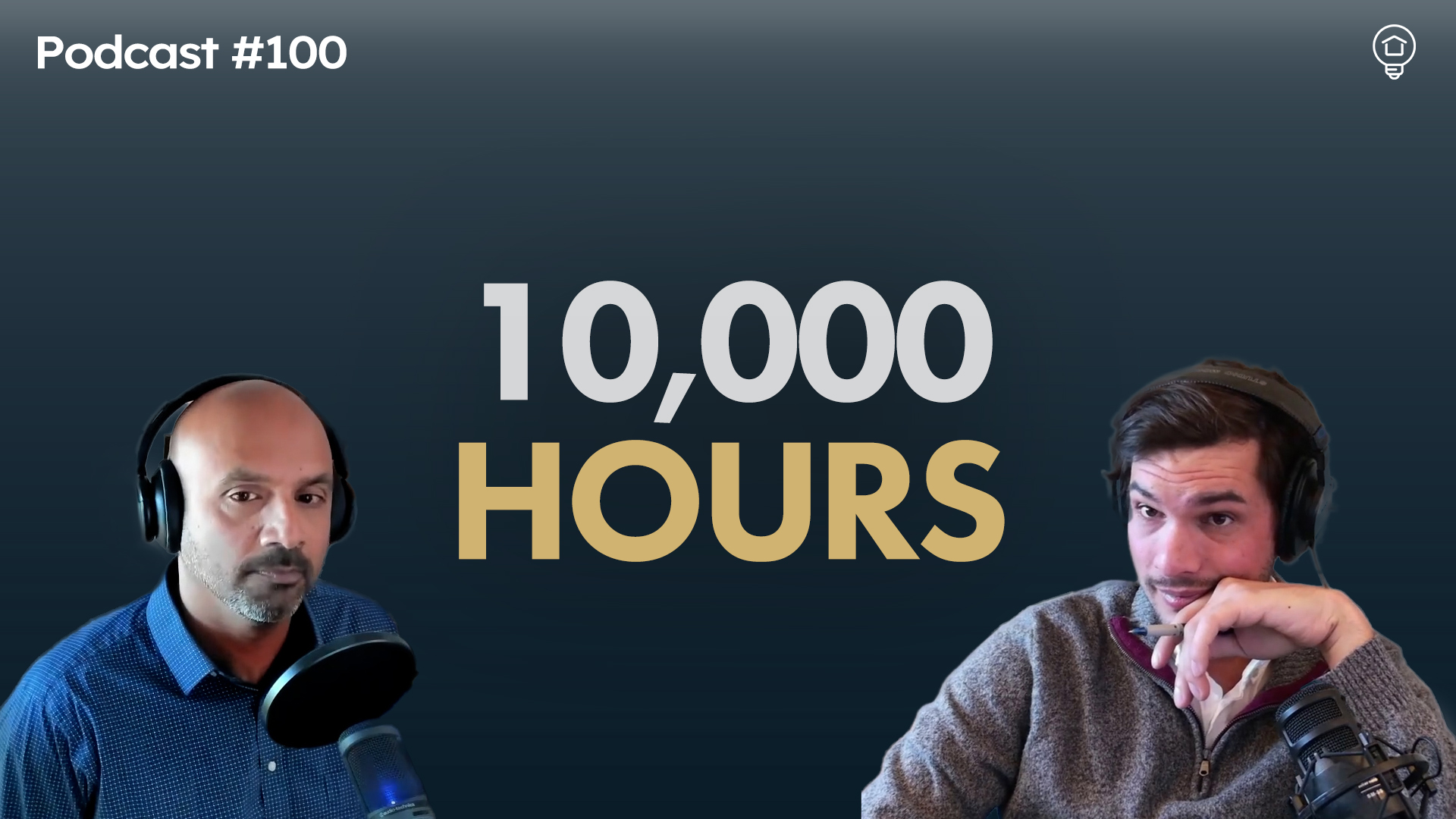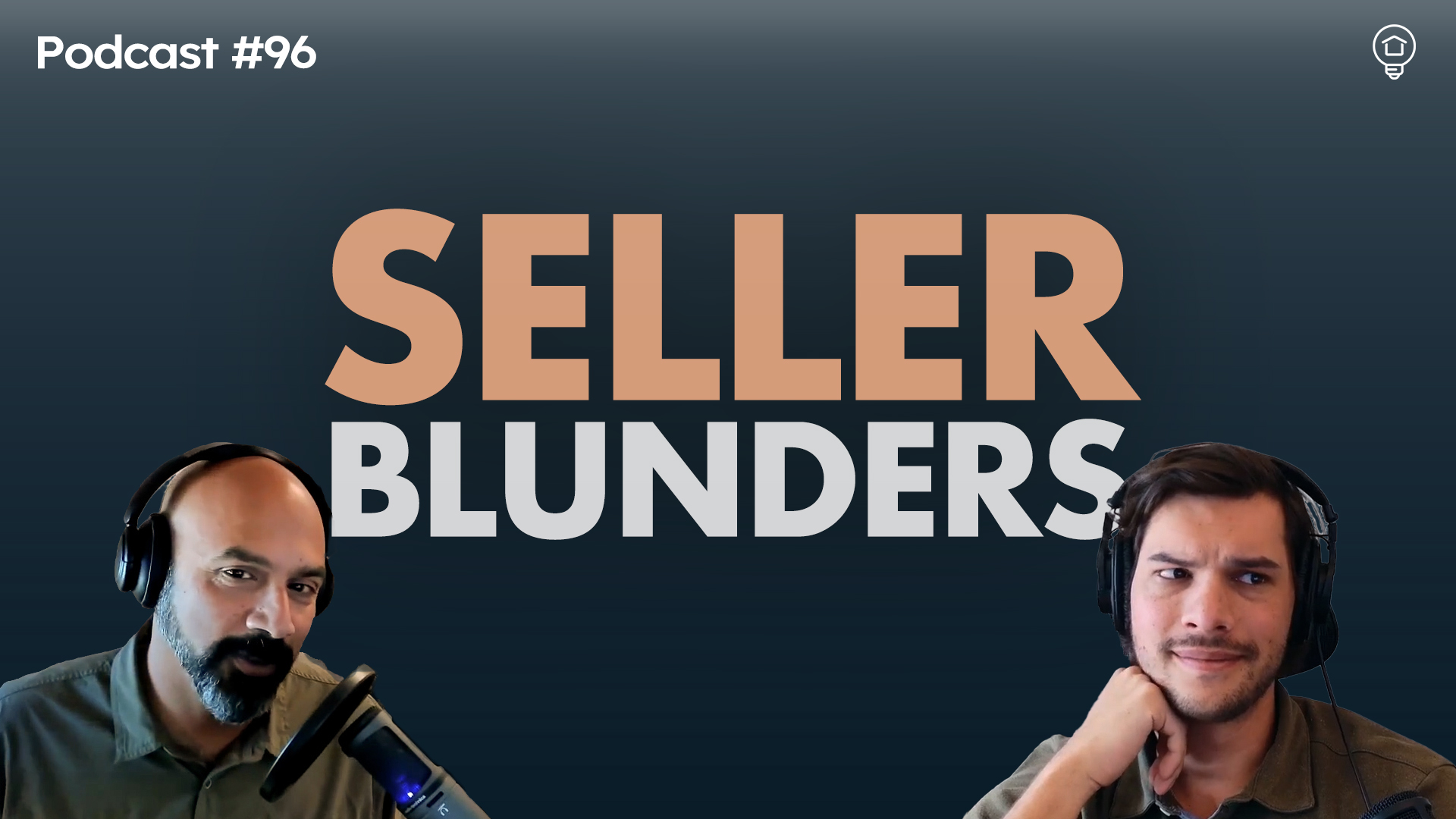Non MLS Sales, Asymmetric Risk and Misaligned Incentives
by Osman Parvez
—-
Private transactions remain a small fraction of the overall market, but last week I met a broker who bragged about how often he’s closing them.
I asked him how the sellers felt about the money they were leaving on the table. His response? “It’s always their choice.”
In my opinion, it’s not much of a choice if you don’t understand the risks and the benefits. You’re more likely to go with whatever your Realtor tells you is best. Private transactions are fraught with risks to the seller. Not coincidentally, they’re also filled with financial reward for the listing agent.
Let’s quantify the asymmetrical risk and return for the seller and their listing agent.
Let’s Get the Facts Straight
Background Fact #1: It’s a common practice for a listing agent to offer sellers a discount for selling the property to an unrepresented buyer. This is known as a variable commission. Realtors like to call it “double ending” the deal. Variable commissions usually have the seller pay 4% instead of a 6% commission. Note: these are the most common numbers for local real estate transactions, but not set in stone.
Background Fact #2: In the current market, listings are often selling for far more than asking. As of mid February, nearly thirty Boulder sales have already exceeded the asking price. The median premium was 4.1%. One went for 8.5% more than asking.
Background Fact #3: The median sold house price in Boulder last year was $685,000. I’m using this value for all three scenarios below.
Please look at the table and follow along.
Scenario A: Private sale. The listing agent sells the property to his “sphere” before it hits the MLS. The seller accepts the risk of limited exposure because the listing agent reduced the commission of 4% instead of his usual 6%. Surprise, surprise… the listing agent procures an offer from an unrepresented buyer for full asking. The listing agent collects his 4% or $27,400, doesn’t have to pay a buyer’s agent, and the seller nets $657,600 before title insurance and other closing costs.
Scenario B: MLS sale. After a reasonable period on the MLS, several buyers throw their hat into the ring. The winning buyer pays 2.13% more than asking.
Why 2.13%? To illustrate the break even point for the seller for accepting the risk of limited exposure. If the listing sells for exactly 2.13% more than list, the net proceeds for the seller are exactly the same as Scenario A. The overall risks aren’t the same, but we’ll get to that below. Just remember 2.13%.
Scenario C: Another MLS sale. This time, professionally managed marketing program and bidding war drives the sale price to 4.1% more than asking or $713,085. Why 4.1%? Because that’s the median premium for houses that exceeded the asking price thus far in 2015. In this case, the listing agent makes $22,819 because they have to pay the buyer’s agent $19,966. So even though the total commission is 6%, the seller nets $670,300 or $12,700 more than the “double ended” private sale. The listing agent makes $4,581 less.
Do you see the asymmetrical risk and return for the seller in the scenarios above? The seller bears almost 3x the financial risk as the listing agent for a double ended deal. If professional marketing and well run bidding war obtains just 2.13% more than list, the net proceeds break even. If the bidding war hits the median premium, the seller nets substantially more.
A Few Factors to Consider
Pricing and Negotiation – If an experienced Realtor is marketing your home for sale, the asking price should be based on the best comparable sales and an analysis of the trend for appreciation/depreciation of similar properties. If your agent is truly working in your best interest, they should price slightly ahead of the trend and leave a little cushion for inspection.
In a private sale, the listing agent has a powerful financial incentive to selectively present the comps and price your home low. It’s a proven fact that when listing agents are selling their own homes, they price higher and negotiate harder. In this inventory deprived market, sellers are throwing cash at even marginal properties. Why not let Mr. Market decide the real value?
Waved Contingencies – In the open market, inspections are often curtailed to increase the attractiveness of offers. Smart buyer’s agents are also adding appraisal cushions and other techniques to sweeten the deal. In a private sale, where the buyer is unrepresented, the listing agent faces a lot of risk in advising the buyer to wave any contingencies. Most private, non MLS sales will keep contingencies that would have been eliminated in a bidding war because they protect the listing agent. With such little inventory and low transactions, deals are often facing low appraisals. An open market transaction gives the seller tremendous leverage to reduce buyer contingencies before the contract is signed.
Liability: If a listing agent is double ending a deal, they don’t represent the buyer and have very little responsibility towards the buyer’s interests. In many cases, the listing agreement automatically switches the agent’s status to “Transaction Broker.” This takes them off the hook for most of the seller’s interests too. In my opinion, a broker with little liability is far more likely to not disclose material facts that can adversely affect the sale. They’ve got a powerful financial incentive to forget about certain details that were say, spoken but not documented.
In Colorado, your Realtor has insurance coverage for errors and omissions. As a seller, how are you covered?
My Advice
Make sure your listing agreement addresses asymmetry in risk and reward. If your Realtor denies it, find a better Realtor. The contract should always align seller and listing agent incentives. Variable commissions are fine if they allow a reasonable period for open market exposure on the MLS and directly address the added liability. If not, the seller is not only leaving money on the table but encouraging the listing agent to stuff it into their own pocket.
Additional Reading: Colorado Real Estate Commission Position 44
—-
Want to get blog updates via email? Click HERE.
Ready to buy or sell? Schedule an appointment or call 303.746.6896.
You can also like our Facebook page or follow us on Twitter.
As always, your referrals are deeply appreciated.
—
The ideas and strategies described in this blog are the opinion of the writer and subject to business, economic, and competitive uncertainties. We strongly recommend conducting rigorous due diligence and obtaining professional advice before buying or selling real estate.
Non MLS Sales, Asymmetric Risk and Misaligned Incentives
by Osman Parvez
—-
Private transactions remain a small fraction of the overall market, but last week I met a broker who bragged about how often he’s closing them.
I asked him how the sellers felt about the money they were leaving on the table. His response? “It’s always their choice.”
In my opinion, it’s not much of a choice if you don’t understand the risks and the benefits. You’re more likely to go with whatever your Realtor tells you is best. Private transactions are fraught with risks to the seller. Not coincidentally, they’re also filled with financial reward for the listing agent.
Let’s quantify the asymmetrical risk and return for the seller and their listing agent.
Let’s Get the Facts Straight
Background Fact #1: It’s a common practice for a listing agent to offer sellers a discount for selling the property to an unrepresented buyer. This is known as a variable commission. Realtors like to call it “double ending” the deal. Variable commissions usually have the seller pay 4% instead of a 6% commission. Note: these are the most common numbers for local real estate transactions, but not set in stone.
Background Fact #2: In the current market, listings are often selling for far more than asking. As of mid February, nearly thirty Boulder sales have already exceeded the asking price. The median premium was 4.1%. One went for 8.5% more than asking.
Background Fact #3: The median sold house price in Boulder last year was $685,000. I’m using this value for all three scenarios below.
Please look at the table and follow along.
Scenario A: Private sale. The listing agent sells the property to his “sphere” before it hits the MLS. The seller accepts the risk of limited exposure because the listing agent reduced the commission of 4% instead of his usual 6%. Surprise, surprise… the listing agent procures an offer from an unrepresented buyer for full asking. The listing agent collects his 4% or $27,400, doesn’t have to pay a buyer’s agent, and the seller nets $657,600 before title insurance and other closing costs.
Scenario B: MLS sale. After a reasonable period on the MLS, several buyers throw their hat into the ring. The winning buyer pays 2.13% more than asking.
Why 2.13%? To illustrate the break even point for the seller for accepting the risk of limited exposure. If the listing sells for exactly 2.13% more than list, the net proceeds for the seller are exactly the same as Scenario A. The overall risks aren’t the same, but we’ll get to that below. Just remember 2.13%.
Scenario C: Another MLS sale. This time, professionally managed marketing program and bidding war drives the sale price to 4.1% more than asking or $713,085. Why 4.1%? Because that’s the median premium for houses that exceeded the asking price thus far in 2015. In this case, the listing agent makes $22,819 because they have to pay the buyer’s agent $19,966. So even though the total commission is 6%, the seller nets $670,300 or $12,700 more than the “double ended” private sale. The listing agent makes $4,581 less.
Do you see the asymmetrical risk and return for the seller in the scenarios above? The seller bears almost 3x the financial risk as the listing agent for a double ended deal. If professional marketing and well run bidding war obtains just 2.13% more than list, the net proceeds break even. If the bidding war hits the median premium, the seller nets substantially more.
A Few Factors to Consider
Pricing and Negotiation – If an experienced Realtor is marketing your home for sale, the asking price should be based on the best comparable sales and an analysis of the trend for appreciation/depreciation of similar properties. If your agent is truly working in your best interest, they should price slightly ahead of the trend and leave a little cushion for inspection.
In a private sale, the listing agent has a powerful financial incentive to selectively present the comps and price your home low. It’s a proven fact that when listing agents are selling their own homes, they price higher and negotiate harder. In this inventory deprived market, sellers are throwing cash at even marginal properties. Why not let Mr. Market decide the real value?
Waved Contingencies – In the open market, inspections are often curtailed to increase the attractiveness of offers. Smart buyer’s agents are also adding appraisal cushions and other techniques to sweeten the deal. In a private sale, where the buyer is unrepresented, the listing agent faces a lot of risk in advising the buyer to wave any contingencies. Most private, non MLS sales will keep contingencies that would have been eliminated in a bidding war because they protect the listing agent. With such little inventory and low transactions, deals are often facing low appraisals. An open market transaction gives the seller tremendous leverage to reduce buyer contingencies before the contract is signed.
Liability: If a listing agent is double ending a deal, they don’t represent the buyer and have very little responsibility towards the buyer’s interests. In many cases, the listing agreement automatically switches the agent’s status to “Transaction Broker.” This takes them off the hook for most of the seller’s interests too. In my opinion, a broker with little liability is far more likely to not disclose material facts that can adversely affect the sale. They’ve got a powerful financial incentive to forget about certain details that were say, spoken but not documented.
In Colorado, your Realtor has insurance coverage for errors and omissions. As a seller, how are you covered?
My Advice
Make sure your listing agreement addresses asymmetry in risk and reward. If your Realtor denies it, find a better Realtor. The contract should always align seller and listing agent incentives. Variable commissions are fine if they allow a reasonable period for open market exposure on the MLS and directly address the added liability. If not, the seller is not only leaving money on the table but encouraging the listing agent to stuff it into their own pocket.
Additional Reading: Colorado Real Estate Commission Position 44
—-
Want to get blog updates via email? Click HERE.
Ready to buy or sell? Schedule an appointment or call 303.746.6896.
You can also like our Facebook page or follow us on Twitter.
As always, your referrals are deeply appreciated.
—
The ideas and strategies described in this blog are the opinion of the writer and subject to business, economic, and competitive uncertainties. We strongly recommend conducting rigorous due diligence and obtaining professional advice before buying or selling real estate.
Share This Listing!
More about the author
Osman Parvez
Owner & Broker at House Einstein as well as primary author of the House Einstein blog with over 1,200 published articles about Boulder real estate. His work has appeared in the Wall Street Journal and Daily Camera.
Osman is the primary author of the House Einstein blog with over 1,200 published articles about Boulder real estate. His work has also appeared in many other blogs about Boulder as well as mainstream newspapers, including the Wall Street Journal and Daily Camera. Learn more about Osman.
Work with
House Einstein
Thinking about buying or selling and want professional advice?
Call us at 303.746.6896
Your referrals are deeply appreciated.














